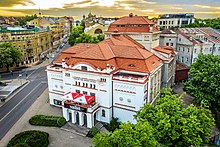
Vilnius is the capital of and largest city in Lithuania and the second most populous city in the Baltic states. As of January 2024, Vilnius' estimated population was 602,430, and the Vilnius urban area which extends beyond the city limits had an estimated population of 708,627.

Regimantas Adomaitis was a Lithuanian film and stage actor. He was also active in Russia and Germany.
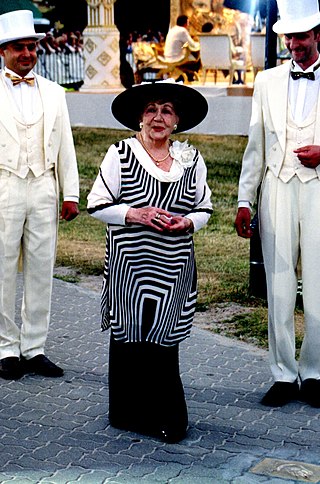
Anna Weronika Bielicka was a Polish singer and actress who was known by the name Hanna and its affectionate diminutive Hanka.

Eimuntas Nekrošius was a Lithuanian theatre director.
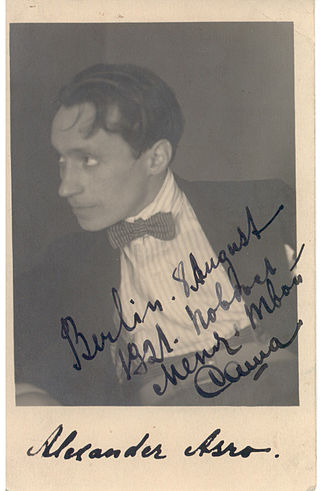
Alexander Asro was a film and theatre actor. He was a member of the Vilna Troupe and appeared in several comedic films in the United States.

The National Kaunas Drama Theatre (NKDT), formerly Kaunas State Drama Theatre, is a theatre and theatre company in Kaunas, Lithuania. The company is the oldest professional theatre troupe in Lithuania, founded in 1920 at the building now known as the Kaunas State Musical Theatre. It moved to its current location, the building formerly housing the "Metropolitain" cinema, in 1959.
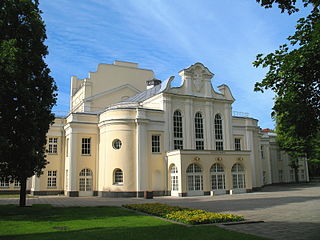
The Kaunas State Musical Theatre, formerly Kaunas City Theatre, is a theatre in Kaunas, Lithuania. It is home to a musical theatre company of the same name, established on 27 November 1940 in the former State Theatre hall on the Laisvės Alėja.

Irena Górska-Damięcka was a Polish actress, mise-en-scène designer, and theater director.

The Alexandrinsky Theatre or National Drama Theatre of Russia is a theatre in Saint Petersburg, Russia.
Saulius Mykolaitis was a Lithuanian director, actor, and singer-songwriter (bard).
Lithuanian National Opera and Ballet Theatre (LNOBT), founded as Operos vaidykla, is an opera house and ballet theatre in Vilnius, Lithuania.

Jerzy Duszyński was one of the most popular actors in a post-war Poland. He starred in a number of film productions as well as theatrical plays.
Valka Town Theatre is one of the oldest theatres in Latvia, in the town of Valka, North Vidzeme. Its activity started on 10 May 1871, with the production of Hesse Vahgesa's play "Kleine Lisa".
The Polish Theater in Vilnius is a Polish-language theater in Vilnius, Lithuania. It was founded in 1963 by actress and director Irena Rymowicz. It staged its first premiere comedy Ladies and Hussars by Aleksander Fredro in 1965. In 1990, the Polish Theater in Vilnius was awarded a collective Honorary Badge of Merit for Polish Culture from the Polish Ministry of Culture. Since 1992 the artistic director and director of the theater is Irena Litvinovič.

Ivan Aleksandrovich Vyrypaev is a Polish playwright of Russian descent, screenwriter, film director, actor and art director. He is a leading figure in the New Drama movement. Founder and general producer of the private Polish foundation WEDA PROJECT. Artistic Director and General Producer of the foundation for creative and spiritual development "Teal House" in Warsaw. Winner of numerous literary, theatrical and film awards, including the Venice Film Festival, Stuckemarkt International Contemporary Drama Festival, Warsaw Film Festival, Rome Film Festival and many others.

Paolo Emilio Landi is an Italian theatrical director, journalist, and documentarian. He has filmed worldwide a number of documentaries for RAI. He directed plays at several different theatres in the US, in Russian Federation and former Soviet Union.

Juozas Miltinis’ Drama Theatre is a state theatre in the town of Panevėžys, Lithuania, approximately 130 km north of the capital Vilnius. It is the main place for drama in town with a permanent troupe of actors and large performing spaces. During the Soviet era the theater was well known across the Soviet Union for outstanding performances directed by Juozas Miltinis, a legendary personality, who led the theatre for decades. He worked with actors such as Donatas Banionis. Because of its noticeable impact on town's life and culture, the theater continues to maintain a distinct connection with its local audience. Since autumn 2017 a team of young theatre creators have been leading the theatre, who are focusing on developing the creative space, providing opportunities for experiments of emerging directors, allowing actors’ artistic abilities to evolve and creating new experiences for whole theatre team.
America in the Bathhouse is a three-act comedy by Keturakis. The play was first published in 1895. It became the first Lithuanian-language play performed in public in present-day Lithuania when a group of Lithuanian activists staged it on 20 August 1899 in Palanga. The play depicts an episode from the everyday life of the Lithuanian village – a resourceful man swindles money from a naive woman and escapes to the United States. Due to its relevant plot, small cast, and simple decorations, the play was very popular with the Lithuanian amateur theater. It became one of the most popular and successful Lithuanian comedies of all time and continues to be performed by various troupes.

Barn theatre is a tradition in Lithuania to stage amateur theatre performances and music concerts in barns.
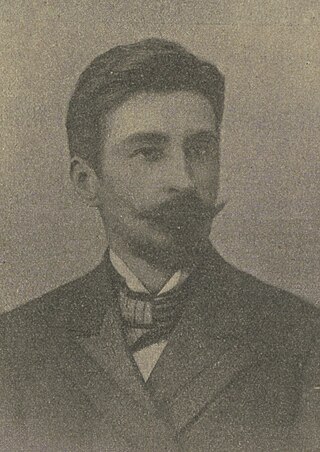
Wacław Michniewicz was a Polish-Lithuanian architect active in Vilnius, Lithuania.
